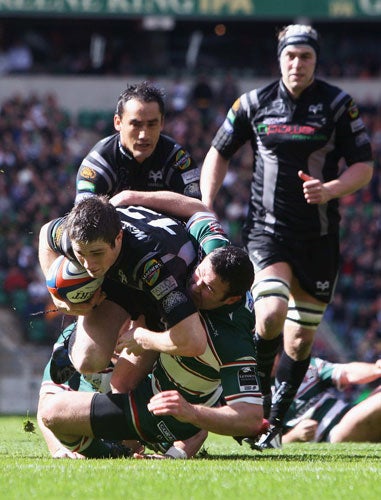Anglo-Welsh Cup revamp to include English second tier

It is not so very long since the clubs in English rugby's Second Division – National Division One, to use its latest proper name – loathed the very sight of their swanky, fully professional brethren in the Guinness Premiership, and there is a good deal of suspicion sloshing around even now. But imaginative plans to expand the Anglo-Welsh section of the domestic season will draw the more ambitious second-tier teams closer to the big time, while giving the sport the greater geographical spread it craves.
The current half-baked, largely unloved EDF Energy Cup, which features the 12 Premiership clubs and the four Welsh regions, will be scrapped at the end of the coming season. Precious few English teams take it seriously unless and until they find themselves in the semi-finals – for many, it is nothing more than an opportunity to give underused fringe players and young up-and-comers an afternoon's gainful employment – and even fewer will mourn its passing.
In its place, according to the Welsh Rugby Union, which yesterday confirmed that negotiations with Twickenham were well advanced, will be a 20-team competition contested by the top four ND1 teams along with the usual suspects. There will also be a junior tournament for the eight remaining ND1 clubs, together with half a dozen from the Principality Welsh Premiership, the second-tier competition in Wales.
If, as many believe, the new top-tier tournament is played during the Six Nations Championship, it will strengthen the Premiership in England by ensuring that top international players appear in more of their clubs' league games than is presently the case. Anything that strengthens the integrity of England's "marquee" competition will win the backing of the majority of the paying public, if not of those supporters whose clubs tend to win Premiership matches only when their more powerful opponents are shorn of front-line personnel.
There are a number of bridges still to be crossed: a seven-figure sponsorship deal is the minimum requirement – not easy to find with the economy at a standstill – and someone will have to convince the lesser lights in ND1 that the present 16-team league format should be reduced by 25 per cent. Whatever the likes of Newbury and Sedgley Park say to this, let alone Manchester and Otley, who won promotion to ND1 last season, it is almost certain to be unprintable.
But for the more realistic contenders, armed with go-ahead managements and full-time playing squads – and, in some cases, state-of-the-art facilities – it is a major opportunity. Leeds, who suffered one of their frequent relegations from the Premiership last term, still believe they can mix it with the big boys, while Exeter and Cornish Pirates, neither of whom have ever made it into the top flight, are impatient to give it a go. They are not alone. Nottingham, Doncaster, Bedford and London Welsh are also beginning to think they have what it takes.
In recent years, the penny has dropped with the Twickenham grandees that their game needs a fully competitive Second Division if it is to prosper. A revamped 12-team arrangement would bring England in line with France, where the elite Top 14 competition has long been underpinned by the Pro D2, which now boasts such names as Agen, Beziers, Grenoble and Pau, all of them former champions.
Bath, whose sharp upturn in fortunes last season was betrayed by their inexplicable failure to retain the services of their best players, the lock Steve Borthwick and the midfielder Olly Barkley, took a more positive step yesterday by signing Michael Claassens (below), their South African scrum-half, for two more years. Together with Butch James, his fellow Springbok, the Free Stater was at the heart of the club's resurgence, which saw them win the European Challenge Cup and qualify for the Premiership play-offs.
"There is no other club in England I would consider joining," Claassens commented. "I'm very happy with the coaching team and I think Bath are capable of going somewhere great."
One of those coaches, the skills and defence specialist Brad Davis, was in no doubt as to the significance of the player's decision. "Michael made a huge impact as soon as he arrived. He has good speed around the ruck, he's tough ... he has all the characteristics you would want in a scrum-half."
Subscribe to Independent Premium to bookmark this article
Want to bookmark your favourite articles and stories to read or reference later? Start your Independent Premium subscription today.

Join our commenting forum
Join thought-provoking conversations, follow other Independent readers and see their replies